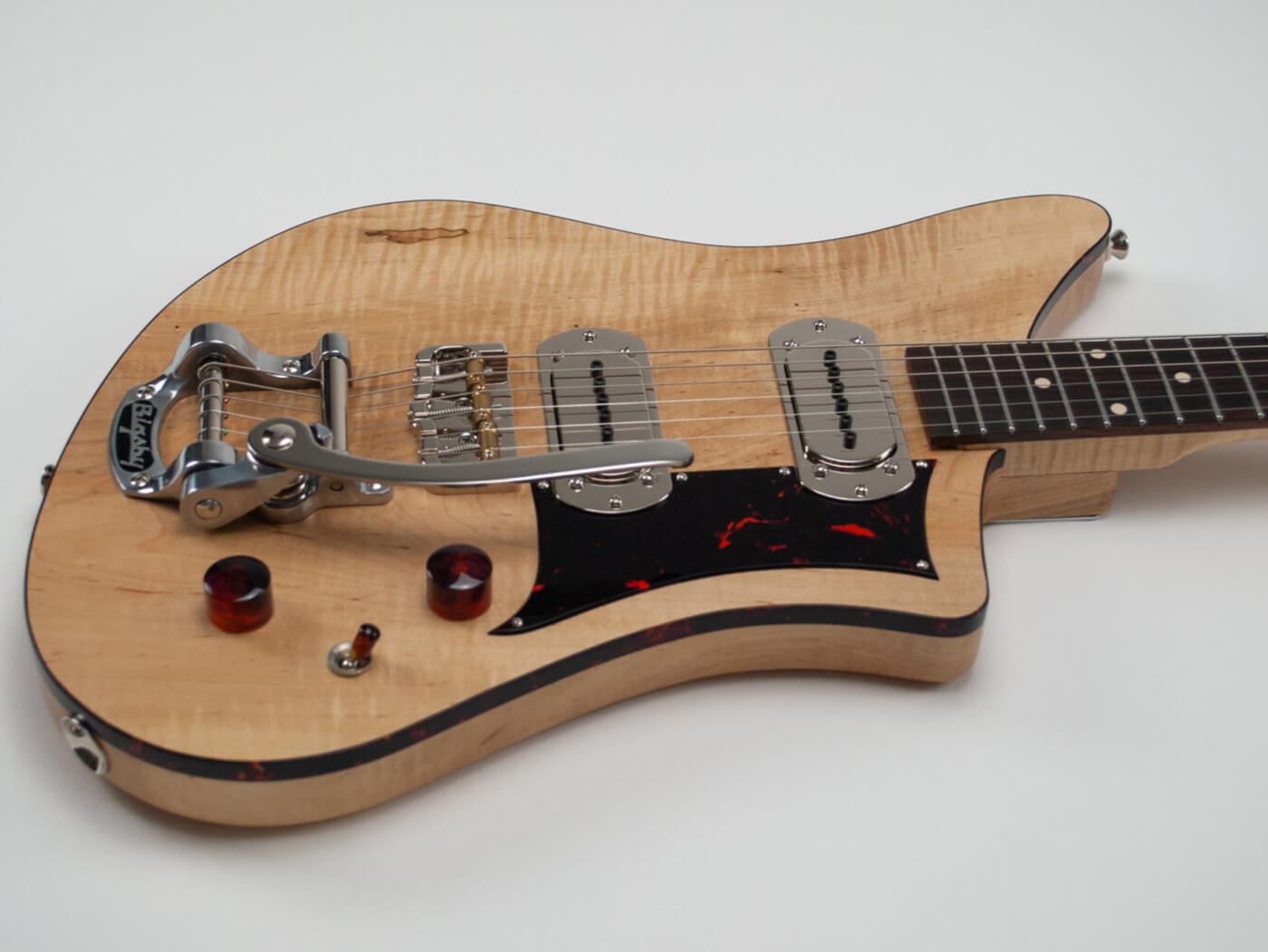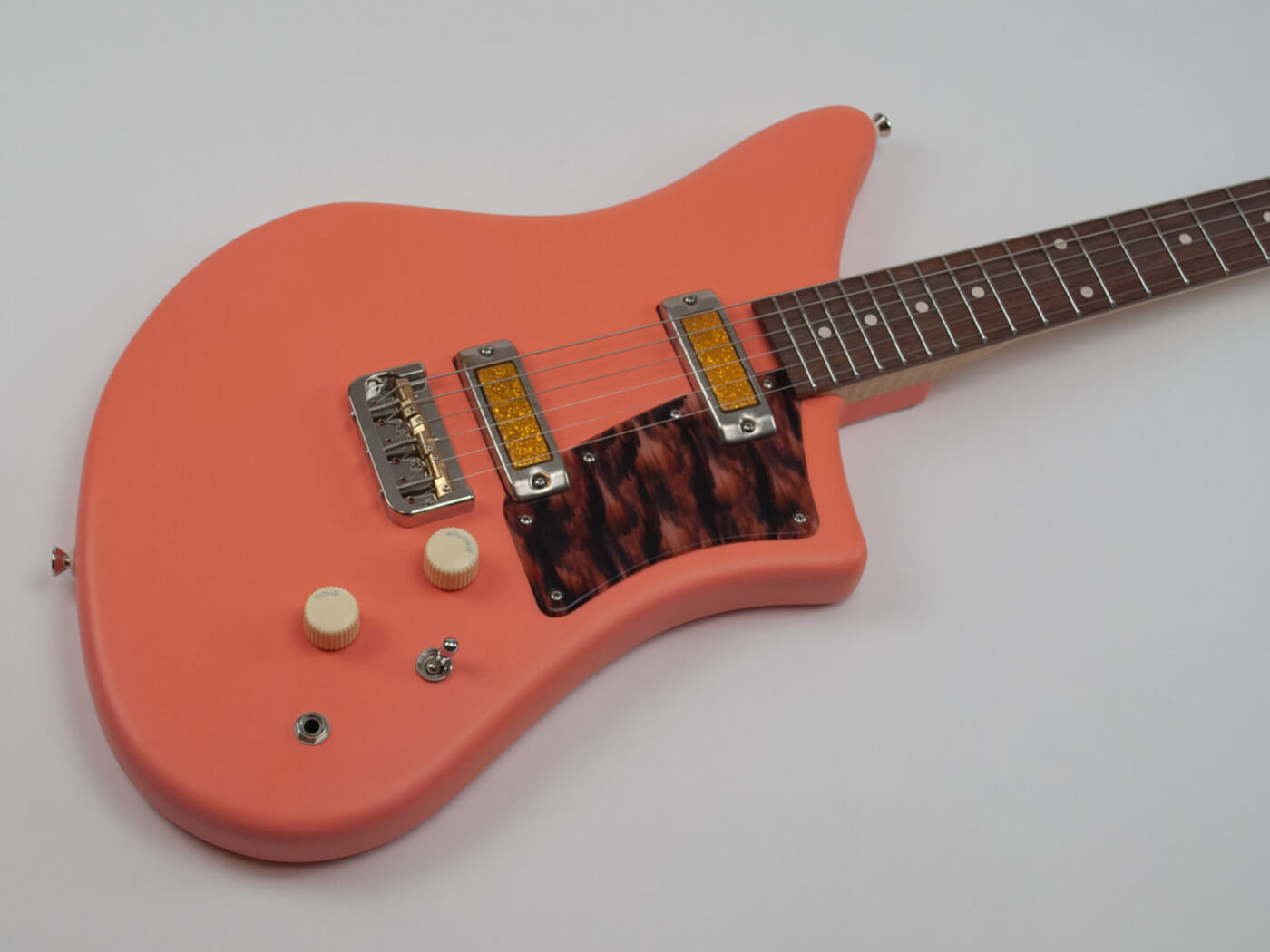Related Tags
“It bothered me seeing how many tropical and rainforest woods were still being used”: Lord Guitars’ Nate Lord on sustainability in the guitar industry
The Amesbury, Massachusetts company’s head luthier discusses the environmentalist upbringing that inspire his guitars, repurposing vintage pickups and reimagining mid-century designs.

What first piqued your interest in electric guitars?
“Being a teenager and getting into classic rock is what first did it. My music tastes have been ever changing since then, but I still gravitate towards guitar-centric music. Once I started playing it didn’t take long before I started experimenting with making them – my dad is a great woodworker and having access to his shop and expertise from a young age made it a natural progression.”
All your instruments are made using responsibly sourced or reclaimed woods, resulting in interesting wood choices like fir or butternut. Why are you building guitars in this manner?
“My mom Debbie was a passionate environmentalist, working and volunteering for many environmental organizations throughout her life. She taught me a great love and respect for nature and the earth. As I got into building guitars it bothered me seeing how many tropical and rainforest woods were still being used. Brazilian rosewood is a great example – the furniture and musical instrument industries have nearly decimated the species. So, when I set out to launch my own guitar brand, I decided that I would put an emphasis on using domestic and salvaged woods. It’s been a lot of fun experimenting with what many would consider ‘alternative’ tonewoods.”
You also repurpose vintage pickups and use recycled plastics too! Why is this approach so important to you and the guitar industry as a whole?
“Much like my approach to wood selection, I started seeking out vintage pickups and pickguard materials to minimize the environmental impact of my builds. There’s also something cool about old pickups – there were companies like DeArmond, Guyatone, Teisco, Kay, and others experimenting with all kinds of pickup designs that really sound great in their own different ways. A lot of them look great too, which doesn’t hurt! I’m a sucker for cool looking vintage stuff.”

Prior to starting Lord Guitars, you worked as a technician and apprentice with Becker guitars. How did that experience influence your approach to luthiery?
“Becker was an incredible learning experience. In the repair shop I got to hone my skills in making guitars play to their best potential, and got used to the repetition of critical parts of that process – fret work, nut work, setups, and an understanding of the geometry and principles behind guitar construction. I also got to work on their custom builds, where I learned techniques in woodworking and finishing, as well as guitar design.”
Your catalogue is limited to just two designs, with a third on the way. Why have you streamlined production?
“Mainly because I am a one-person shop, and it takes me a while to design something that I am happy with. I’m not really interested in making copies of the classics, so I strive to make guitars that evoke those designs but still bring something original to the table. My Mystic shape draws influence from a variety of classic offsets of the 60s, and my Merrimack shape – the new one that I’m prototyping – is an electric singlecut inspired by the parlor guitars of the 40s and 50s.”
Did you have any external investment starting out?
“No, this is a self-funded venture, with lots of reinvestment from my repair work, guitar builds, and Lord Guitar Pickups sales.”

When did you realise you had a viable business?
“Just now I suppose! In seriousness, it’s always been affirming to get them into the hands of players and see how they respond.”
Your designs are based on catalogue models of the 50s and 60s. How are you reviving and updating those styles for the modern player?
“The 50s and 60s saw an explosion in American, Japanese, and European electric guitar production. Companies like Harmony, Silvertone, Guyatone, Teisco, and Kawai were cranking out an unthinkable variety of different shapes and styles in those days, far more than today’s large manufacturers seem to be willing to experiment with. They weren’t always built to the highest standards though. I try to capture the spirit, originality, and retro-futuristic designs of those days but with modern playability and functionality.”
Despite your vintage influence, you’re also a fan of the ‘fat neck, fat sound’ ethos, with a more modern 12” radius for all of your necks…
“As I got my hands on more and more guitars as a repair guy, I really gravitated towards the ones with fatter necks. I found them more comfortable in the hand, and they always seemed to make the guitar sound ‘bigger.’ Guitars with fat necks are usually louder and more resonant unplugged in my experience, which is a good indicator that they’re going to sound great plugged in. The 12” fretboard radius is another feature that just feels right to me – flat enough to allow for bending and movement across the neck, but still round enough to be comfortable for chords.”
What’s your proudest moment as a luthier?
“When I deliver a guitar to a customer and see them ‘click’ with it – that is the most rewarding part for me. I put a lot of love into them and I’m always proud when a new owner falls in love with one of my builds. I’m proud to have a bunch of exciting musicians playing them right now – players like Mike T. Kerr and Cody Nilsen who are taking classic music styles and breathing new life into them with their own original sounds.”
What does the future hold for Lord Guitars?
“Ramping up production of my existing models and maybe bringing another design into the line-up. I picked up lap steel during the pandemic and would like to try making a few of those. I’m also expanding on my ‘rebuilds’ line where I take old, left-for-dead funky guitars and give them new frets, nuts, hardware, and electronics so they play like new. It’s been something I’ve been experimenting with as my ‘budget line’ and the response has been really positive so far. Ultimately just chasing whatever’s making me excited when it comes to guitars and hoping for the best!”
Visit lordguitars.com for more.
